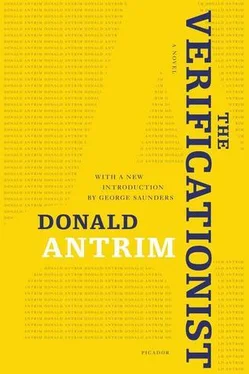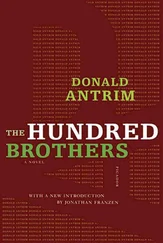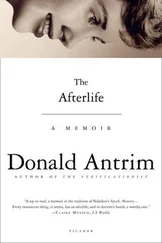The atmosphere was tense. Complex power dynamics were at work. Bernhardt, by threatening to fatally gag on other people’s food, had taken the role of usurper, “capturing” not only the food but the sympathies of his peers. Unfortunately for him, there was not space in the booth for me to wrap my arms around his body, to reach over, if necessary, and squeeze him hard. Bernhardt’s stomach pressed against the table’s edge. He held cinnamon-raisin toast in one hand and his napkin in the other. He made a noise in his throat, and this noise sounded beautiful, forlorn, like faraway bagpipes or wind in trees. As if in response to Bernhardt’s sound, Maria leaned forward across the tabletop; she leaned toward the fat man. She looked as if she might weep. She did not touch Bernhardt; Maria’s hands stopped short of touching; they floated, tentative, in the air near Richard’s face. What beautiful fingers she had. I felt, looking at Maria’s face and those hands, as if I were a trespasser witnessing something wonderful and mysterious.
In this way it became clear — from this tableau made by these two: the man struggling for breath; the woman craning toward him; and their lovely stillness as, for a moment, they regarded one another — it became clear, in the way these things become, in such a public moment, oddly, inexplicably clear to others, that Maria and Bernhardt were sleeping together.
Or was it conceivable that I only imagined this scenario (the scenario and my perception of it), because I had actually perceived — in ways that I did not understand and could not account for, that evening over pancakes, bacon, and a salad — that Manuel, our Kleinian across the table, was already sleeping with my wife?
In other words, had Manuel somehow told me a truth about his involvement with Jane, without telling me anything at all? And was it not possible, even likely, if this was so, that everyone was sleeping with everyone — including Bernhardt and Maria? The question I am raising is this: Did my belief that my Institute colleagues were lovers come from observation and recognition of subtle interpersonal signals, the unconscious communications between them, or did it come from inside me, from my own barely perceptible feelings and awarenesses, those feelings that I was not, at the time, fully alert to, feelings about Manuel, about Jane, about sex and rivalry in sex, about the strange and precarious nature of human relationships, about the excruciating complexities of infidelity, stolen ecstasy, and guilt?
“Swallow.”
Bernhardt shuddered; his Adam’s apple rose, then fell. Food, it seemed, went down. Muscles in Bernhardt’s neck relaxed, and he raised his napkin and spit out more food he had not forced down. This food he wrapped, meticulously, in the napkin. The crisis was over and we all leaned back in our seats. Bernhardt took a drink from his water glass and said, “That always happens.”
I felt, in that instant, unable to remain in a booth with this overweight father figure. “Richard, would you excuse me for a minute?”
“Sure thing, Lieutenant. You want to get up?” asked Bernhardt before biting toast — the man still eating in spite of the problems eating caused.
“Yes. And, Richard, I’d appreciate it if you wouldn’t call me Lieutenant. It reminds me of something I’d rather not think about.”
“What’s the big deal, Tom? That was years ago. It’s not like you killed anybody. Stabbing that guy out at the Grove was an accident.”
“That’s not the point.”
Bernhardt waved his toast in the air, a little motion presumably indicating that he would move aside as soon as he finished chewing. Others in the noisy restaurant raised forks and cups, but my appetite was gone; life felt wretched to me. Maria, a beauty when younger and still handsome in her forties — stylishly dressed, carefully made up and wearing good shoes, that sort of thing — appeared, to my eyes, that night at the Pancake House & Bar, tired and a little displeased, aged somehow: by time, naturally, but also by disappointment; by, I suppose you could say, the disappointments of living. Her mouth as she ate worked slowly. With each new bite, Maria’s tongue came out, far out, in the manner of a tongue at the onset of fellatio, one of those intense, illicit blow jobs she used to give whenever the two of us could slip away, late on an afternoon, to the Institute’s book and manuscript vault, the subcellar archive with no windows, back in our early days as Institute trainees. Out came the tongue to meet the food on the fork. Maria’s tongue was thick and blue, you could say purple almost; and it had the blunted, rounded contours of a medium-size putty knife. Here was a tongue that, believe me, kissing, could really fill your mouth. Now food previously taken in, little spots of wet color, clung to its surface.
And so the erotic in memory becomes, at a later stage in life, unseemly. Again and again Maria’s tongue emerged, met, then blanketed and enveloped the lump of oncoming fried sausage, or the scrambled eggs, or a piece of potato; next it slowly withdrew, a violet thing luring the fork toward Maria’s mouth. Fillings were visible, silver, shimmering; and I could see, deep in her mouth, that dead tooth that had gone brown. It is probably true that I would not have been so disturbed by Maria’s mouth, her chewing and swallowing, had I not wished, maybe for old times’ sake, as they say, to feel, again, that heavy tongue pushing past her teeth, past my teeth.
Have you ever noticed? — people, no matter how beautiful or desirable, invariably will, if observed closely while going about their daily business of keeping alive, begin to seem like monsters.
Bernhardt was not moving from the booth. I watched him eat. It would not be wrong to say that I was, in a manifestly physical sense, sickened by the sight.
“Thomas, what are you doing?” asked Escobar.
“I’m afraid I’m not feeling well, Manuel. I think I need to walk around. I’ll be fine if I get some air.” I turned my body. I secured a grip on the seat back, then hoisted my feet, first the left, then the right foot, out from beneath the low tabletop. I bent my knees and raised my legs. I rested my shoes on the seat. I was working in a tight space. “Watch out, Richard. Don’t move.” I half stood on the seat and, leaning sideways against the seat back, keeping my balance, taking care not to knock Bernhardt in the head, wormed one leg, the left, up, over, and down into the vacant booth behind. From there it was an easy slide into the empty seat and freedom. I saw coworkers watching me, and I noticed our waitress watching too, and I waved to her and shrugged my shoulders and rolled my eyes and made a goofy face and a lot of relatively meaningless hand gestures in the air, and she smiled.
Bernhardt took another distressed breath. “Do you see what I mean, Maria? The man has no regard for social protocols. He’s like a two-year-old!”
I have to admit that this was, as a diagnosis, pretty much correct. I have found, however, that it is best to understand Bernhardt’s criticisms and complaints — no matter how flattering, when considered in the right context — as nothing more than self-administered medications against the man’s own terror of vitality, autonomy, playfulness, the life force in any form. I stood and said, “This is a pancake restaurant, Richard.”
“What the hell has that got to do with it?”
I spoke to Bernhardt — spoke, as well, to the entire room, all my Krakower Institute peers gathered around tables stacked with dishes and balled napkins and half-empty cups. Waitresses circled, offering refills. Strangers at distant booths stopped talking, finished chewing, and attended to my improvised discourse.
“What is a pancake? Cooked batter, covered in sugar and butter. Condiments are applied to it. It is food. But it is not as a food, not as sustenance, that we crave the pancake. No, the pancake, or flapjack if you will, is a childish pleasure; smothered in syrup, buried beneath ice cream, the pancake symbolizes our escape from respectability, eating as a form of infantile play. The environments where pancakes are served and consumed are, in this context, special playrooms for a public ravenous for sweetness, that delirious sweetness of long-ago breakfasts made by mother, sweetness of our infancy and our great, lost, toddler’s omnipotence. Look around. Notice, if you will, these lighting fixtures suspended from the ceiling like pretty mobiles over a crib. Notice the indestructible plastic orange seating materials designed to repel spills and stains. Notice these menus that unfold like colorful, laminated boards in those games we once played on rainy days at home, those unforgettable indoor days when we felt safe and warm, when we knew ourselves, absolutely, to be loved. We come to the Pancake House because we are hungry. We call out in our hearts to our mothers, and it is the Pancake House that answers. The Pancake House holds us! The Pancake House restores us to beloved infancy! The Pancake House is our mother in this motherless world!”
Читать дальше












